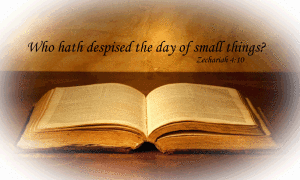 In Ephesians we have the relationships of the saints with God the Father, and with the ascended Christ.
In Ephesians we have the relationships of the saints with God the Father, and with the ascended Christ.
First we have our calling, involving our relationships with God and with the Father. Then we have our acquaintance with all God’s plans, everything being headed up in Christ. Hence we know our inheritance, and our place as heirs, the Holy Spirit having been given as earnest till the redemption of the inheritance.
In chap.1, Paul prays to the God of our Lord Jesus Christ (Christ being looked at as man), that the saints might know what God’s calling and inheritance is, and that we might appreciate the power that works in us. This power was shown in Christ, when God raised Him from the dead and set Him at His own right hand, setting Him over all things, and making the church His body and completeness.
Then, in sovereign grace, we are quickened, raised, and made to sit in heavenly places in Christ. This shows the exceeding riches of His kindness to us. The Gentiles were afar off; the Jews were dispensationally near, all forming one new man in Chris – the dwelling-place of God on earth by the Spirit. Thus we have the assembly connected both with Christ as His body on high, and as God’s dwelling-place on earth by His Spirit.
The mystery is now introduced for the first time. It is a witness of the all-various wisdom of God in heavenly places. The apostle then prays to the Father of our Lord Jesus Christ that we may realise the full blessedness of this, Christ dwelling in our hearts by faith. Being rooted and grounded in love, we are to be able to comprehend the infinitely wide extent of the character of God’s glory, and to know the love of Christ. So we can at the centre of it all according to the fullness of God Himself. With this he ascribes glory to God in the church in all ages, implying the distinct, continuous existence of the assembly.
Note that in chapter 3:15 read “every family,” instead of “the whole family.” (As in Darby version) In verse 18, the breadth, and depth, and length, and height is not “of the love.” The whole of chapter 3 is parenthetic, and the first words of chapter 4 connect themselves with the beginning of chapter 3.
At the start of chapter 4 the apostle unfolds, in connection with the headship of Christ, the various unities into which we are brought. There are three unities: a real one, one of profession, and a universal one in God. First, one body, one Spirit and one hope. Secondly, one Lord, one faith, one baptism. Thirdly, one God and Father of all, who is above all, through all, and in us all. We are to walk in lowliness, so as to endeavour to keep the unity of the Spirit in the bond of peace.
Then we have the gifts – instruments of building and edification. The gifts are from the ascended Man, who overcame Satan and led him captive, so as to gather and perfect the make those who were formerly Satan’s captives, the instruments of His own warfare in power. At the same time He who ascended is the One who first descended into the lower parts of the earth, so as to fill all things. The measure to which the saints are to be brought up is that of the stature of the fullness of Christ Himself; the body being fitted together, and supplied by every joint in order for its own building up. We start with the individual. Then we get exhortations connected with the new man being created of God in righteousness and true holiness. It is only the new man which has to do with righteousness and holiness.
We are to be imitators of God, and act as Christ Himself has acted in love – the perfect expression of God – the new man. Furthermore, in this new man we are light in the Lord. The measure of our walk and works is the light itself, of which Christ, if we are awake, is to us the perfect outshining. Hence we are to be wise in the midst of this world. In going through our relative duties, Paul speaks of the relationship of the church to Christ, founded on the working of His love. He first gives Christ’s giving Himself for it; next, Christ sanctifies and cleanses it by the word; and, thirdly, He presents it to Himself a glorious church, without spot or wrinkle or any such thing. Two things are to be noted:
- That, in the analogy with Adam and Eve, Christ stands in the place both of Adam and God.
- The intimate connection between Christ’s present operation and the glory.
He sanctifies and cleanses the church, so that He might present it to Himself. Then, the church, as well as being His wife, is presented as His body. According to the analogy of Eve. Christ is looked at as nourishing and cherishing it, as a man would his own flesh (chap. 5).
Finally, Christians are exhorted to put on the whole armour of God, and in His might enter into combat, entirely dependent on Him (chap. 6).
Originally by JND. Lightly edited by Sosthenes, September 2014
– Se A Brief Outline of the Books of the Bible for the original




